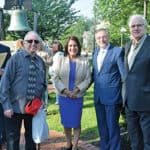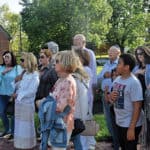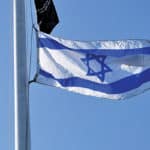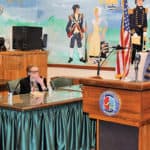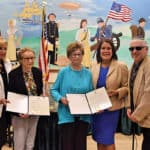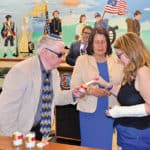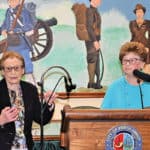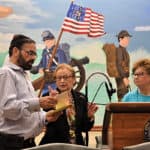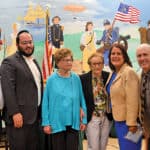City Hall, Perth Amboy 6/4/19
*Photos by Paul W. Wang
By: Katherine Massopust
PERTH AMBOY – The Holocaust Days of Remembrance Ceremony are celebrated nationally since 1979 and has been officially been observed in Perth Amboy for the last 8 years under the leadership of Mayor Wilda Diaz. The ceremony includes an Israeli Flag Raising and speakers who were Holocaust survivors. At one time, there was a large Jewish population in Perth Amboy. The purpose of the Days of Remembrance is to raise awareness and educate people by hearing first hand accounts from those who suffered the atrocities of the Holocaust.
Perth Amboy observed the Holocaust: Days of Remembrance this year on June 4th. The ceremony began with the raising of the Israeli flag in City Hall Circle and was followed by an observance ceremony in City Council Chambers which included speakers Holocaust Survivors Adela Froiman and Sabina Taubenfeld.
Herschel Chomsky offered a few words. He referenced recent violent attacks on Jews (in many places in the world) that still occur today. “We received a warning from the German government not to wear Yamakas in public. I say, ‘No.’ I wear my Yamaka every day. Of all places, to say it. This day is important. The Holocaust will be taught everywhere to people of any religion, any nationality. We’ll overcome this. It hurts me to say we have to continually say this. It’s unimaginable what they (the Holocaust victims) had to go through.”
Fire and Police Chaplain Gregory Pabon gave the invocation. He thanked everyone who made the ceremony possible. He especially thanked High School Teacher Rachel Wittenberg who arranged for students to be here and film the ceremony to learn what this is all about.
Mayor Wilda Diaz welcomed everyone including members of the Lakewood Community who with the help of the local Jewish Community and the staff of Days of Remembrance across the country. “They host observance ceremonies for their community. I believe the most important part of the observance is to listen to the living testimony here. I want to hear directly from you. We cannot tolerate injustice. We have to be courageous to stand up for what’s right.”
Diaz then gave a proclamation to the two guest speakers: Adela Froiman and Sabina Taubenfeld, who are sisters who were born in Minsk Mazowieck, Poland.
There was a candle-lighting ceremony to honor the Holocaust victims led by Herschel Chomsky and Mayor Diaz. Some of the attendees participated in the ceremony.
Moti (Marc) Lieberman came up to speak. He explained how he works to keep the memory of the Holocaust alive and to tell the world the stories of the survivors. He then stated that Germany has released the documents of those who were occupied in concentration camps. He passed around a card which had his mother’s father’s (maternal grandfather) photo and exact details of his features that the Nazis had. “The document came in the mail. They have an account of every inmate.” Lieberman continued, “My eyes are still red.”
He then introduced the two guest speakers.
Sabina Taubenfeld spoke first. She explained how everyone in her family including her father, two older brothers, one sister, her grandfather, and great-grandfather that only the two sisters survived the Holocaust. “I was 17 years old in 1939. We had a ghetto. All had to stay in the ghetto, wear the Star of David. We couldn’t go to school. We had to take in all kinds of relatives.”
Adele Froiman spoke next, “Our father had a bakery. We got along with the Jewish and non-Jewish residents. In 1942, they made us go to the ghetto. We took gold, cash, and money to take with us (what they could). My parents, two brothers and my sister – they (the Nazis) took everything. Everyone was taken to the ghetto. One Saturday morning we were going to work, and we were shipped to Treblinka (an extermination camp built and operated by Nazi Germany in occupied Poland).” Froiman stated, “They killed all of them.”
Lieberman then passed around a photo of 16 friends. Froiman then added, “Only two of the people in the photo survived. One girl is in Israel, now.”
Taubenfeld stated, “For a period of time, I was separated from my sister.”
Froiman stated, “Everyday, there was an inspection. I covered myself with a blanket. I kept washing myself. I washed my hair with coffee. I was always hungry. It was hard times. We used to work every day cutting wood and took it back to camp.”
Taubenfeld stated, “I wanted to go to Germany to be a maid, but I was young. I said I was 17, but I wasn’t. I was 14 years old. I had some money and signed up. The lady in charge said I was Jewish. I said “No.” I was Polish. We were sent to a Warsaw ghetto. I saw people with diseases. Two or three weeks before they destroyed the Warsaw ghetto – they burned it down. I saw the smoke and got away – with a little bit of luck, too. On June 5th, they destroyed our place. It was a Saturday. They (the Nazis) came. We ran and kept running.”
Froiman stated, “Bullets were all over the place. One bullet – a piece of it hit me. I had a small infection. I didn’t think much about it. A boy showed us – there was a round cage – a place to hide. It locked from the inside. When they (the Nazis) came, the little boy came by. The German asked the boy if he knows how to open it. He said, “No.” Outside, one girl was screaming, “I am not Jewish!” The Nazi shot her. At night, we got up, we gave another girl jewelry and asked her if there is a place to hide. There was me and another little girl, too. She took us to the place. It was a basement underneath a porch.”
Taubenfeld said, “It was a very poor family. We stayed there 18 months in the cellar. It was full of rats. There were 4 of us. It was horrible. We never put on the heat. It was such a small place.”
Froiman stated, “We laid underneath the porch. She (the owner) was very poor. It was bad as a cage. She had 2 daughters in Warsaw. We heard the woman was pregnant from a man in another town. She had a little boy with him. They killed him. She couldn’t go anyplace. She had a gentleman. Her husband was in Warsaw. Jewish women in the Polish Underground looked Polish – not Jewish. She came to visit us and brought us food, money, and tried to help us. She knew people needed help. We spent 18 months under the porch. After the war was over, we came out. I couldn’t walk. I was like a baby. I had to learn how to walk. They asked me where do you want to go? We went to live in the town we were born in. It took 3 months to learn to walk again.”
Froiman stated, “I went to visit her every day.”
Taubenfeld said, “I now have 2 daughters and 4 grandchildren.”
Froiman said, “I now have 3 daughters and 8 grandchildren.”
Taubenfeld was sent from Germany to orphanage and she came to America. She came to the USA in 1947. “I had no family there. I lived in St. Paul Minnesota.”
Froiman came to Montreal, Canada and stayed there for 4 years. “My sister did not want to come to Canada, so I came here.”
Both sisters want people to learn about the Holocaust. “It can happen to anybody. Love each other. It is important.”
The ceremony concluded with a hymn and a Benediction.
Marc Lieberman mentioned the book, “The Pit and the Trap: A Chronicle of Survival” by Leyb Rochman stating all should read that book.


